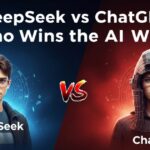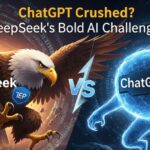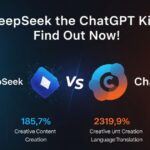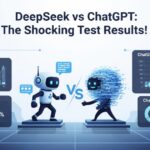The artificial intelligence world is buzzing with debate after a newly released performance comparison revealed some unexpected findings. Two of the most talked-about AI models — DeepSeek and ChatGPT — were recently tested head-to-head across several benchmarks. The results? Shocking, to say the least.
For years, ChatGPT has led the AI chatbot space with its highly intuitive, human-like responses. Powered by OpenAI’s cutting-edge models, it has become a household name among businesses, students, and developers alike. But now, DeepSeek, an emerging open-source alternative, is challenging that dominance — and many users are stunned by how well it’s performing.
In a series of blind user tests conducted across different platforms, DeepSeek reportedly outperformed ChatGPT in factual accuracy, mathematical problem-solving, and multilingual translations. However, ChatGPT continued to lead in areas like creative writing, emotional tone, and conversational flow.
This unexpected outcome has split the AI community, especially on platforms like Reddit, X (formerly Twitter), and GitHub. “I never thought anything could match ChatGPT’s flexibility,” said user @aiCoderTech, “but DeepSeek just solved a coding issue that GPT kept misunderstanding.”
Others weren’t so quick to switch sides. Many users defended ChatGPT’s long-term reliability and its richer integration with tools like DALL·E, browsing, and advanced memory features. “DeepSeek might be sharper in some areas,” tweeted AI researcher Lena Morris, “but ChatGPT still feels like a more complete assistant.”
This growing discussion has sparked the now viral debate: DeepSeek vs ChatGPT — which is truly better?
The comparison isn’t just about technical performance. DeepSeek is seen as a symbol of the open-source AI movement. It offers more transparency and gives developers freedom to adapt and modify the model. On the other hand, ChatGPT — particularly in its GPT-4 and GPT-4o variants — is backed by massive infrastructure, professional support, and a wide ecosystem of plugins and tools.
The battle between these two AI models is shaping into a clash of philosophies: Open and community-driven vs. closed and enterprise-grade. The divide among fans reflects deeper conversations about the future of AI — who controls it, who can access it, and how it should evolve.
Interestingly, educators and researchers are also weighing in. A recent study by Stanford researchers found that students using DeepSeek performed slightly better in technical quizzes, while those using ChatGPT excelled in essay composition and language comprehension tasks.
So, what’s next?
With new updates expected from both sides, it’s clear this isn’t a one-time event. As more users put these models to the test in real-world scenarios, the DeepSeek vs ChatGPT rivalry will only grow more intense.
For now, one thing is certain: the AI race is wide open, and the shocking results have only added fuel to the fire. Whether you’re a developer, writer, or just an AI enthusiast, the conversation is far from over — and it’s one worth watching closely.







